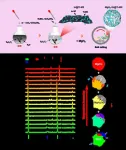(Press-News.org) At a glance:
National study of quality of care in hospitals acquired by private equity shows worsening of fall and infection risk, other measures of quality and safety.
Some post-procedure adverse events increased even though private equity hospitals performed fewer procedures among younger and less disadvantaged patients.
The new findings amplify existing economic concerns about the growth of this for-profit ownership model.
Patients are more likely to fall, get new infections, or experience other forms of harm during their stay in a hospital after it is acquired by a private equity firm, according to a new study led by researchers at Harvard Medical School.
The research, published Dec. 26 in JAMA, is among a handful of recent nationwide analyses of how private equity takeovers affect the quality of patient care in hospitals. The increases are seen in conditions or outcomes deemed preventable and are key measures of hospital safety and quality.
The findings come amid growing concerns about private equity’s increasing role in U.S. health care, with $1 trillion invested in the past decade.
“We had previously found that private equity acquisitions led to higher charges, prices, and societal spending,” said Zirui Song, associate professor of health care policy and medicine in the Blavatnik Institute and director of research in the Center for Primary Care at HMS. “Now, we’re learning that there are also downstream concerns for the clinical quality of care delivered to hospital patients.”
The researchers said the findings are alarming because they may reflect bottom-line incentives overshadowing patient care and safety.
“Hospital success is measured not only in dollars or the number of patients who pass through the doors, but also in lives saved, complication rates, patient satisfaction, and a number of other quality and safety metrics,” said HMS research fellow Sneha Kannan, a physician in the Division of Pulmonary and Critical Care at Massachusetts General Hospital. “We need to make sure we fully understand the costs and benefits of this prominent new force in health care.”
The economic repercussions of private equity acquisitions are not a new concern. Previous studies by Song and co-author Joseph Dov Bruch of the University of Chicago indicate that this high-debt, for-profit financial model of hospital ownership may also lead to increased spending and other economic implications. Many have expressed concerns about hospital bankruptcies under private equity ownership that often leave underserved populations with limited access to care. But up until now, the effects of private equity deals on patient health and quality of care have remained understudied and poorly understood.
Why private equity is different
“When health systems buy hospitals, they generally do not use borrowed money,” said Song, who is also an internal medicine physician at Mass General. “In contrast, the classic private equity buyout uses a small amount of cash, but a large amount of debt.”
A private equity firm raises some capital from investors and borrows the rest, putting debt on the acquired hospital with its physical assets, such as land and buildings, as collateral for the loan. The acquired hospital must then generate revenue to pay down that debt.
Private equity generates revenue by charging management fees to its investors — commonly, pension funds, endowments, and other institutions or individuals — as well as by focusing on high-revenue procedures, cost-cutting, reorganization, and financial engineering. One argument in favor of private equity investments is that many struggling hospitals need capital and management expertise. However, most private equity buyouts are of successful operations. Private equity firms want to buy going concerns that are able to take on debt and generate revenue in the short run. These financial pressures can create perverse incentives favoring profit over patients, the researchers say.
Private equity and quality of care
For this study, the researchers examined insurance claims data for all fee-for-service Medicare hospitalizations from 2009 to 2019, totaling more than 600,000 hospitalizations at 51 private equity hospitals and more than 4 million hospitalizations at 259 similar hospitals not acquired by private equity. The hospitals not acquired by private equity served as the control group to control for other factors that may have affected outcomes.
The researchers compared how often patients experienced certain outcomes before and after the hospital was acquired by private equity. For example, they looked at how often patients fell while in the hospital or how often they developed an infection after a procedure or a surgery. The team also analyzed the makeup of the patient populations and various other outcomes such as how often patients died, how long they stayed at the hospital, and how often they ended up readmitted after leaving the hospital.
After a hospital was acquired by private equity, admitted Medicare patients had a 25 percent increase in hospital-acquired complications, compared with patients admitted before acquisition. Patients also had 27 percent more falls and 38 percent more bloodstream infections caused by central lines, which are temporary surgically inserted ports that allow easy intravenous access for patients receiving repeated drug infusions or other treatments.
The increase was seen despite private equity hospitals’ placing 16 percent fewer central lines than before the buyout. All of these results were calculated while taking into account changes, trends, and patterns over the same period of time at peer hospitals not owned by private equity to isolate the differences that were due to the change in ownership.
Curiously, the study found a small drop in hospital deaths at private equity hospitals. This, the researchers said, may be due to social and demographic factors — private equity patients were younger and less disadvantaged than those at peer hospitals not owned by private equity. It may also be due to patients getting transferred more often out of private equity hospitals. When the researchers followed patients longer after discharge, the small decrease in deaths dissipated within a month after leaving the hospital.
Framework for policy solutions
Policymakers, insurance companies, and public sector bodies have grown increasingly concerned about protecting patients and societal resources from the effects of private equity transactions.
Earlier this year, Song and Christopher Cai, a HMS clinical fellow in medicine at Brigham and Women’s Hospital, outlined such a policy framework in a JAMA viewpoint article, which included regulating fraud and abuse, increasing antitrust oversight, reducing moral hazard (such as by lowering the debt used in acquisitions), protecting against inflated prices, and transparency in reporting of private equity acquisitions.
Currently, only private equity acquisitions over $111.4 million must be reported. This threshold may capture many hospital acquisitions but leaves out most acquisitions of physician practices.
“Private equity firms have historically operated in the shadows in health care,” Kannan said. “Going forward, it’s important to lift the veil and increase transparency.”
And both researchers and policymakers should be rigorous in their efforts to understand how private equity changes health care operations and the downstream consequences, the authors cautioned.
“Patients and providers, investors and taxpayers, employers and insurers, all have a stake in this,” Song said. “Understanding what the corporatization of health care delivery means is a goal shared by many across society.”
Authorship, funding, disclosures
The current work was supported by a grant from the National Heart, Lung, and Blood Institute (T32HL15502-03). It was also supported by grants from the National Institute on Aging (3P01AG032952-14S1) and Arnold Ventures (20-04402).
END
Quality of care declines after private equity takes over hospitals
Patient falls, infections, other measures of safety worsen after buyouts
2023-12-26
ELSE PRESS RELEASES FROM THIS DATE:
Changes in hospital adverse events and patient outcomes associated with private equity acquisition
2023-12-26
About The Study: Private equity acquisition of hospitals, on average, was associated with increased hospital-acquired adverse events despite a likely lower-risk pool of admitted Medicare beneficiaries, suggesting poorer quality of inpatient care. These findings heighten concerns about the implications of private equity on health care delivery.
Authors: Zirui Song, M.D., Ph.D., of Harvard Medical School in Boston, is the corresponding author.
To access the embargoed study: Visit our For The Media website at this link https://media.jamanetwork.com/
(doi:10.1001/jama.2023.23147)
Editor’s Note: Please see the article for additional ...
Variation by institution in sexual harassment experiences among medical interns
2023-12-26
About The Study: Among a national cohort of medical interns, over half experienced sexual harassment. Although harassment was prevalent across programs, institutional and specialty training variations in interns’ sexual harassment experiences exist, thereby providing additional evidence that residency programs and institutions play an important role in combating this widespread problem.
Authors: Elizabeth M. Viglianti, M.D., M.P.H., M.Sc., of the University of Michigan in Ann Arbor, is the corresponding author.
To ...
Negative wealth shock and cognitive decline and dementia in middle-aged and older adults
2023-12-26
About The Study: In this study of 8,000 participants, negative wealth shock (a loss of 75% or more in total wealth over a 2-year period) was associated with accelerated cognitive decline and elevated risks of dementia among middle-aged and older U.S. adults, with modifications by age and ethnicity. These findings should be confirmed by further prospective and interventional studies.
Authors: Jing Guo, Ph.D., of the Zhejiang University School of Medicine in Hangzhou, China, is the corresponding author.
To access ...
Prediction of 2-year cognitive outcomes in very preterm infants using machine learning methods
2023-12-26
About The Study: The findings of this prognostic study of cognitive outcomes at 2-year follow-up among 1,000 infants born very preterm suggest that predictive modeling in neonatal care could enable early and targeted intervention for very preterm infants most at risk for developing cognitive impairment.
Authors: Andrea K. Bowe, M.B., M.P.H., of University College Cork in Cork, Ireland, is the corresponding author.
To access the embargoed study: Visit our For The Media website at this link https://media.jamanetwork.com/
(doi:10.1001/jamanetworkopen.2023.49111)
Editor’s Note: Please see the article for additional information, including other authors, ...
Pet ownership, living alone, and cognitive decline among adults age 50 and older
2023-12-26
About The Study: Pet ownership was associated with slower rates of decline in verbal memory and verbal fluency among older adults living alone, but not among those living with others in this study of 7,900 participants age 50 and older. Pet ownership offset the associations between living alone and declining rates in verbal memory and verbal fluency. Further studies are needed to assess whether pet ownership slows the rate of cognitive decline in older adults living alone.
Authors: Ciyong Lu, Ph.D., of Sun Yat-sen University in Guangzhou, China, is the corresponding author.
To ...
Scientists use organoid model to identify potential new pancreatic cancer treatment
2023-12-26
A drug screening system that models cancers using lab-grown tissues called organoids has helped uncover a promising target for future pancreatic cancer treatments, according to a new study from researchers at Weill Cornell Medicine.
In the study, published Dec. 26 in Cell Stem Cell, the scientists tested more than 6,000 compounds on their pancreatic tumor organoids, which contain a common pancreatic cancer-driving mutation. They identified one compound—an existing heart drug called perhexiline maleate—that powerfully suppresses ...
Risk of young-onset dementia could be reduced through targeting health and lifestyle factors - study
2023-12-26
December 21 Peer reviewed /observational study / in people*
Strictly embargoed 4PM UK time on Tuesday December 26
Researchers have identified a wide range of risk factors for young-onset dementia. The findings challenge the notion that genetics are the sole cause of the condition, laying the groundwork for new prevention strategies.
The largescale study identified 15 risk factors, which are similar to those for late-onset dementia. For the first time, they indicate that it may be possible to reduce the risk of young-onset dementia ...
In situ characterization reveals different dehydrogenation pathways in MgH2
2023-12-26
They published their work on Dec. 20 in Energy Material Advances.
"Economic, efficient, and safe hydrogen storage methods play a crucial role in exploiting hydrogen energy, reducing carbon emissions, and improving the utilization efficiency of renewable clean energies," said paper author Jianxin Zou, professor in National Engineering Research Center of Light Alloys Net Forming & State Key Laboratory of Metal Matrix Composites. "Solid-state hydrogen storage in hydrides has been considered as a promising hydrogen storage technology. Although the industrial ...
Artificial intelligence predicts the influence of microplastics on soil properties
2023-12-26
Plastic waste and its buildup in nature has become a major environmental concern in recent times. While plastic pollution in the oceans is undoubtedly a concern, the presence of plastics in soils around the world is also known to cause severe environmental and health issues. As plastics fragment into smaller pieces known as microplastics (MPs) in the soil through natural and anthropogenic processes, they drastically alter soil properties. Moreover, they are also absorbed by plants, potentially entering human ...
ACP says barriers to participating in the electoral process must be removed
2023-12-25
Embargoed for release until 5:00 p.m. ET on Monday 25 December 2023
Annals of Internal Medicine Tip Sheet
@Annalsofim
Below please find summaries of new articles that will be published in the next issue of Annals of Internal Medicine. The summaries are not intended to substitute for the full articles as a source of information. This information is under strict embargo and by taking it into possession, media representatives are committing to the terms of the embargo not only on their own behalf, but also on behalf of the organization they represent.
----------------------------
1. ...
LAST 30 PRESS RELEASES:
ASU professor Anne Stone to present at AAAS Conference in Phoenix on ancient origins of modern disease
Proposals for exploring viruses and skin as the next experimental quantum frontiers share US$30,000 science award
ASU researchers showcase scalable tech solutions for older adults living alone with cognitive decline at AAAS 2026
Scientists identify smooth regional trends in fruit fly survival strategies
Antipathy toward snakes? Your parents likely talked you into that at an early age
Sylvester Cancer Tip Sheet for Feb. 2026
Online exposure to medical misinformation concentrated among older adults
Telehealth improves access to genetic services for adult survivors of childhood cancers
Outdated mortality benchmarks risk missing early signs of famine and delay recognizing mass starvation
Newly discovered bacterium converts carbon dioxide into chemicals using electricity
Flipping and reversing mini-proteins could improve disease treatment
Scientists reveal major hidden source of atmospheric nitrogen pollution in fragile lake basin
Biochar emerges as a powerful tool for soil carbon neutrality and climate mitigation
Tiny cell messengers show big promise for safer protein and gene delivery
AMS releases statement regarding the decision to rescind EPA’s 2009 Endangerment Finding
Parents’ alcohol and drug use influences their children’s consumption, research shows
Modular assembly of chiral nitrogen-bridged rings achieved by palladium-catalyzed diastereoselective and enantioselective cascade cyclization reactions
Promoting civic engagement
AMS Science Preview: Hurricane slowdown, school snow days
Deforestation in the Amazon raises the surface temperature by 3 °C during the dry season
Model more accurately maps the impact of frost on corn crops
How did humans develop sharp vision? Lab-grown retinas show likely answer
Sour grapes? Taste, experience of sour foods depends on individual consumer
At AAAS, professor Krystal Tsosie argues the future of science must be Indigenous-led
From the lab to the living room: Decoding Parkinson’s patients movements in the real world
Research advances in porous materials, as highlighted in the 2025 Nobel Prize in Chemistry
Sally C. Morton, executive vice president of ASU Knowledge Enterprise, presents a bold and practical framework for moving research from discovery to real-world impact
Biochemical parameters in patients with diabetic nephropathy versus individuals with diabetes alone, non-diabetic nephropathy, and healthy controls
Muscular strength and mortality in women ages 63 to 99
Adolescent and young adult requests for medication abortion through online telemedicine
[Press-News.org] Quality of care declines after private equity takes over hospitalsPatient falls, infections, other measures of safety worsen after buyouts


